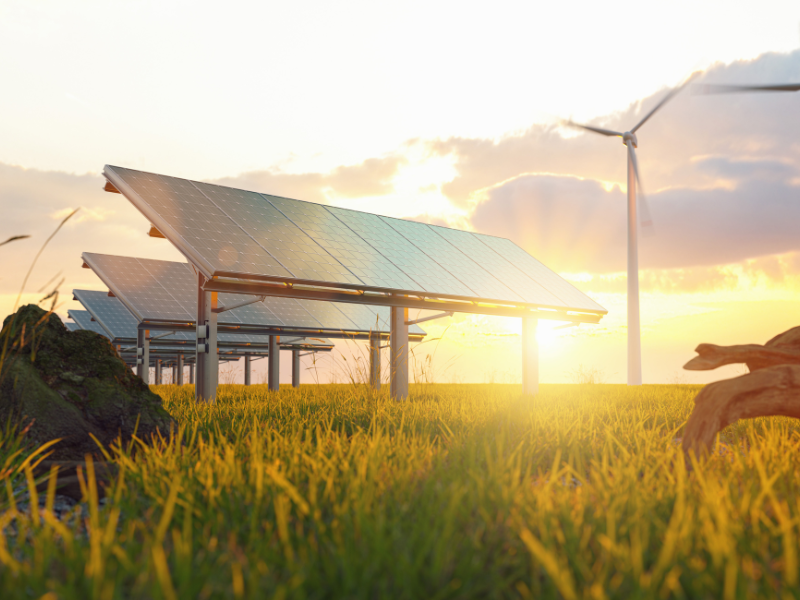Green energy has become a buzzword in recent years as concerns about the environment and climate change have grown. The shift towards using renewable energy sources has gained momentum, with individuals and businesses increasingly embracing green energy solutions. In this article, we will explore the benefits of green energy near you, and how it can positively impact the environment, economy, health, and society as a whole.
What is Green Energy

Green energy, also known as renewable energy, is derived from natural sources that are constantly replenished and do not deplete the earth’s resources. Unlike fossil fuels, which are finite and contribute to pollution, green energy harnesses the power of the sun, wind, water, and other sustainable resources to generate electricity and heat. By using these clean and abundant sources, green energy helps reduce our carbon footprint and mitigate the adverse effects of climate change.
The Benefits of Green Energy

Green energy offers a wide range of benefits, making it a viable and sustainable alternative to traditional energy sources. Let’s explore some of the key advantages of adopting green energy solutions.
Environmental Benefits of Green Energy

Green energy plays a crucial role in preserving our environment and combatting climate change. By reducing reliance on fossil fuels, which emit greenhouse gases and contribute to global warming, green energy helps mitigate the impact of climate change. Additionally, green energy sources produce significantly lower levels of air and water pollutants, improving air quality and reducing harm to ecosystems.
Economic Benefits of Green Energy
Investing in green energy has substantial economic benefits. The renewable energy sector has seen significant growth in recent years, creating numerous job opportunities. As more investments are made in renewable energy projects, employment opportunities in manufacturing, construction, installation, and maintenance of green energy systems continue to expand.
Moreover, green energy helps reduce dependence on foreign oil and volatile fuel prices, providing energy security and stability. By producing energy locally, communities can drive economic growth and retain capital within the region.
Health Benefits of Green Energy
The transition to green energy has positive impacts on public health. Unlike traditional energy sources, green energy does not produce harmful emissions or pollutants. This reduction in pollution improves air quality, leading to a decrease in respiratory and cardiovascular illnesses.
Furthermore, green energy systems, such as solar panels, generate electricity without noise or vibration, eliminating noise pollution, especially in densely populated areas. This contributes to a healthier living environment and enhances overall well-being.
Social Benefits of Green Energy
Green energy promotes social equity and inclusivity. Traditional energy sources often disproportionately impact marginalized communities, leading to environmental injustice. By embracing green energy, we can ensure equal access to clean energy resources, improving the quality of life for all individuals, regardless of their socio-economic status.
Moreover, green energy projects often involve community engagement and participation. This fosters social cohesion, empowers local communities, and strengthens social ties by bringing people together to work towards a common goal of sustainable development.
How Green Energy Works
To fully understand the benefits of green energy, it is essential to grasp how it works. Green energy technologies, such as solar panels and wind turbines, convert natural resources into usable energy. These technologies harness sunlight, wind, and other renewable sources, transforming them into electricity, heat, or mechanical power.
Solar energy systems utilize photovoltaic cells to convert sunlight into electricity. Wind energy systems capture wind energy using turbines that spin generators, producing electricity. Biomass energy utilizes organic matter, such as wood or agricultural waste, to generate heat or electricity. Geothermal energy harnesses the heat from within the earth’s core to generate power. Hydropower energy employs the force of flowing water to spin turbines, generating electricity.
The Role of Renewable Resources
Renewable resources are the foundation of green energy. These resources include sunlight, wind, water, biomass, and geothermal heat. By tapping into these abundant and naturally replenishing sources, we can power our homes, businesses, and entire communities without depleting finite resources or harming the environment.
Harnessing renewable resources is a sustainable approach to meet our energy needs. This ensures the availability of energy for future generations while minimizing our impact on the planet.
Types of Green Energy
There are several types of green energy available, each with its unique advantages and applications. Let’s explore some of the prominent types of green energy and how they contribute to a sustainable future.
Solar Energy
Solar energy is one of the most accessible and abundant green energy sources available. It harnesses sunlight to generate electricity through photovoltaic cells or concentrated solar power systems. Solar energy can be used to power homes, businesses, and even whole communities. With the advancements in solar technology, the cost of solar energy systems has significantly reduced, making it an increasingly popular choice for green energy.
Wind Energy
Wind energy utilizes the power of wind to generate electricity. Wind turbines, placed strategically in windy areas, capture the kinetic energy of the wind and convert it into usable electricity. Wind energy is a clean and reliable source of green energy, with the potential to power large areas and contribute to energy independence.
Biomass Energy
Biomass energy utilizes organic materials, such as wood, crop residues, and animal waste, to generate heat or electricity. These materials can be burned directly or converted into biogas or biofuels through various processes. Biomass energy is considered carbon-neutral since the carbon emitted during combustion is offset by the carbon absorbed during the growth of biomass crops.
Geothermal Energy
Geothermal energy harnesses the heat generated by the earth’s core. This renewable source of energy is obtained by drilling deep into the earth and extracting hot water or steam. Geothermal power plants convert this heat into electricity, providing a constant and reliable source of green energy.
Hydropower Energy
Hydropower energy utilizes the force of flowing water, such as rivers and waterfalls, to generate electricity. Large dams and turbines are used to capture the kinetic energy of the water and convert it into usable electricity. Hydropower is a widely used and mature form of green energy, providing a consistent and reliable source of power.
The Impact of Green Energy
The widespread adoption of green energy can have significant impacts on various aspects of our lives and the planet. Let’s explore some of the notable impacts of green energy.
Reduced Carbon Footprint
One of the main benefits of green energy is the reduced carbon footprint. By minimizing the use of fossil fuels, which release greenhouse gases when burned, green energy helps combat climate change and reduce the emission of harmful pollutants. This shift towards renewable energy is crucial in preserving the planet for future generations.
Energy Independence
Green energy provides countries and communities with energy independence. By utilizing local, renewable resources, communities can generate their own power, reducing reliance on imported fossil fuels. This energy independence enhances national security and reduces vulnerability to volatile fuel prices and geopolitical tensions.
Job Creation
Investments in green energy lead to job creation in various sectors. The renewable energy industry requires skilled workers for manufacturing, installation, and maintenance of green energy systems. Moreover, the development of infrastructure, research and development, and technology advancements in green energy creates employment opportunities across different industries.
Local Economic Development
Green energy projects contribute to local economic development. As communities invest in renewable energy infrastructure, they stimulate economic growth by attracting businesses, creating job opportunities, and fostering innovation. Green energy also promotes energy efficiency, providing cost savings for businesses and individuals, which can be reinvested in the local economy.
Green Energy Near Me
Now, let’s explore the benefits of green energy specifically in your area.
Benefits of Green Energy
The benefits of green energy near you are numerous. By adopting green energy solutions, you can significantly reduce your carbon footprint and contribute to a cleaner and healthier environment. Generating electricity from renewable sources can help combat air pollution, improve air quality, and mitigate the adverse effects of climate change.
Additionally, green energy systems can provide energy independence by harnessing local resources and reducing dependence on imported fossil fuels. This not only contributes to national energy security but also stimulates the local economy by creating job opportunities and attracting investments in green energy projects.
Local Green Energy Initiatives
In [Your Location], there may already be various green energy initiatives and programs in place. These initiatives aim to promote and support the adoption of green energy solutions in the community. Some examples include government incentives for installing renewable energy systems, community solar projects, and educational programs on the benefits of green energy.
To find local green energy solutions near you, you can reach out to your local government agencies, community organizations, or search online for renewable energy providers and installers in your area.
Frequently Asked Questions

What is the cost of installing green energy systems?
Installing green energy systems can vary in cost depending on various factors such as the type of system, size, and location. While upfront costs may be higher compared to traditional energy systems, long-term savings on energy bills and potential incentives and tax credits can make green energy systems cost-effective in the long run. It is recommended to obtain quotes from multiple providers and consult with experts to determine the feasibility and cost of installing green energy systems.
Are there any tax incentives for green energy?
Yes, many governments offer tax incentives to promote the adoption of green energy. These incentives may include federal or local tax credits, grants, or rebates for installing renewable energy systems. It is advisable to consult with a tax professional or visit your local government’s website for specific information on available tax incentives for green energy in your area.
Can I generate income by selling excess green energy?
In certain locations, it is possible to generate income by selling excess green energy back to the grid. This is known as net metering or feed-in tariffs. Under these programs, homeowners or businesses with renewable energy systems can receive compensation for the surplus energy they generate. The specific regulations and rates for selling excess energy may vary by jurisdiction, so it is recommended to check with your local utility provider or energy regulatory authority for more information.
How can I find green energy solutions near me?
To find green energy solutions near you, you can start by researching local renewable energy providers and installers online. Additionally, you can reach out to your local government agencies or community organizations that focus on sustainability and energy efficiency. These organizations often have resources and information on green energy initiatives in your area. It is also helpful to attend local energy expos, workshops, or seminars where you can connect with experts and learn about the latest green energy solutions and technologies.
Conclusion

Green energy offers tremendous benefits for the environment, economy, health, and society. By transitioning towards renewable energy sources, we can reduce our carbon footprint, create job opportunities, improve air quality, and promote social equity. Embracing green energy near you not only contributes to a sustainable future but also brings local economic growth and energy independence. Explore the various types of green energy available, find local green energy initiatives, and start your journey towards a cleaner and greener future. So don’t wait, reap the benefits of green energy near you and be a part of the sustainable solution!

